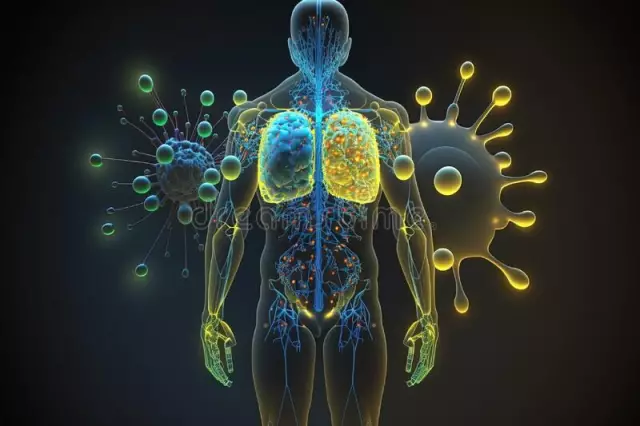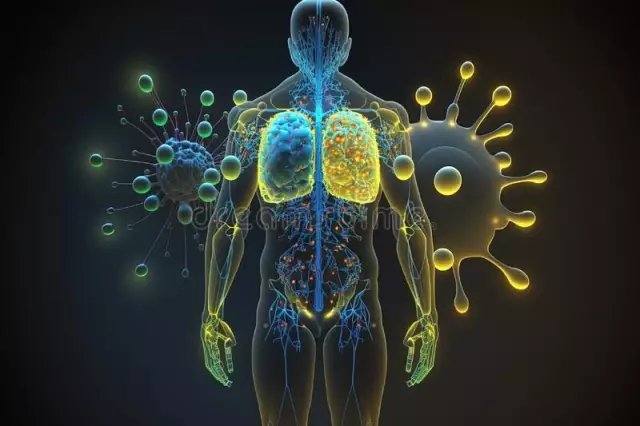- Author Curtis Blomfield blomfield@medicinehelpful.com.
- Public 2023-12-16 20:44.
- Last modified 2025-01-23 17:01.
The human immune system is a collection of cells, tissues and organs that are responsible for providing protection against foreign microorganisms and substances, as well as their own cells whose genetic program has been violated (for example, tumor cells). In the event that any damage or failure occurs in this system, this leads to the death of the whole organism.
Components of the human immune system
Today, the human immune system is represented as a combination of the following organs, tissues and cells:
- Central lymphoid organs (lymphoid formations of the appendix, lymphoid formations of the colon, fetal liver, bone marrow and thymus gland).
- Peripheral lymphoid organs (spleen and lymph nodes).
- Immunocompetent cells (monocytes, lymphocytes, polynuclear leukocytes, Langerhans cells and others).

At the same time, all these cells, tissues and organs are important for the normal functioning of the immune system. Organ systems(digestive, genitourinary, and others) are quite strongly dependent on the level of immunity. In the event that it decreases, then the risk of developing certain infectious diseases, as well as the occurrence of both benign and malignant tumors, increases by an order of magnitude. Therefore, the body's immune system plays a huge role in its normal functioning.
How does the human immune system work?
The immune response to the introduction of a microorganism is carried out by cells such as leukocytes. They come in several varieties: neutrophils (stab, segmented, basophils and eosinophils), monocytes and lymphocytes (B-lymphocytes, T-lymphocytes and NK-lymphocytes). It is neutrophils that are the first to reach the site of infection and begin to destroy foreign microorganisms. At the same time, they cope better with bacteria. If viruses enter the body, then lymphocytes are much more effective against them.

In addition to the fact that the human immune system is able to suppress most of the known microorganisms, it can also "remember" many of them and, in case of re-infection, deal with the trouble much faster (and with less loss to the body itself).

It is worth noting that the immune system, being very useful, can also have negative effects on human life. This is most pronounced after organ transplantation. The fact is that due to the fact that the immune system perceives donor tissueorgan, as foreign, often a rejection reaction occurs. As a result, people have to conduct complex studies and wait for years for a suitable donor. In addition, sometimes the woman’s immune system suppresses the man’s spermatozoa that have got into it, since, again, it begins to consider them alien and dangerous to the body. As a result, the so-called immunological incompatibility of partners is observed. In order for such a couple to be able to have children of their own, the woman has to take immunosuppressive drugs. In the event that the mother's blood Rh factor is negative, and the fetus is positive, then during the first pregnancy she can be immunized. As a result, the next child, if he also turns out to be a carrier of a positive Rh factor, may be subjected to a real attack from the immune system of his mother, which leads to the development of quite serious conditions that threaten both the fetus and the woman herself.






